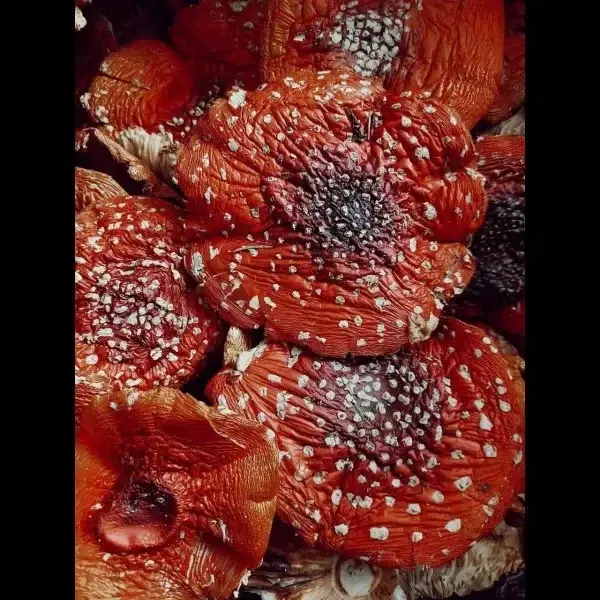Amanita Muscaria extract is a concentrated form of the fly agaric mushroom, containing key compounds like muscimol and ibotenic acid. Studies have shown that this extract may possess neuroprotective and antioxidant properties, making it a subject of interest in research involving neurological health.
Effects on Microglial Cells
In human microglial cell studies, specifically with the HMC3 cell line, Amanita Muscaria extract has been observed to influence inflammatory responses. The extract potentiates the production of pro-inflammatory cytokines such as interleukin-8 (IL-8) and interleukin-6 (IL-6). Additionally, it upregulates surface receptors, including CD86, CXCR4, CD45, CD125, and TLR4, and alters the expression of toll-like receptor 3 (TLR3) mRNA, which are important in immune response modulation. The presence of trehalose, an autophagy inducer within the extract, also enhances IL-8 production in these cells.
Composition and Standardization
Understanding Amanita Muscaria extract’s composition is key, with muscimol identified as its primary active compound. Muscimol is recognized for potential neuroprotective and antioxidant benefits, and research has shown it may help suppress essential tremors without affecting speech or coordination. Standardization of Amanita Muscaria extract typically includes measuring muscimol content, with one study identifying a concentration of 2.94 mg/ml in a prepared extract.
Extract Effects on Neurotoxicity
The neuroprotective and antioxidant activities of standardized Amanita Muscaria extracts have been evaluated in various in vitro models. These extracts demonstrated significant neuroprotective effects on different neurotoxicity models, such as rat brain microsomes, mitochondria, synaptosomes, and SH-SY5Y neuroblastoma cells. Importantly, the extract did not inhibit the human recombinant monoamine oxidase-B enzyme (hMAOB), indicating a favorable safety profile.
Research Implications
These findings suggest that Amanita Muscaria extract may protect neuronal function and reduce oxidative stress vulnerability, offering potential as a supportive agent in neurodegenerative research. Further studies may continue to explore its role in supporting neurological health and resilience.
Microglial Activation and Inflammation
Studies on Amanita muscaria extract reveal that it may modulate pro-inflammatory responses in microglial cells, such as the HMC3 line, which play a key role in neuroinflammation. Specifically, when HMC3 cells are stimulated with compounds like TNF or poly(I), Amanita muscaria extract can influence the production of IL-8, a pro-inflammatory cytokine. This increased production of IL-8 in response to poly(I) suggests that components of Amanita muscaria, including trehalose, may modulate inflammation-related pathways in microglial cells.
These findings contribute to our understanding of how Amanita muscaria extract could potentially interact with neuroinflammatory processes, which are relevant to conditions characterized by excessive inflammation, such as neurodegenerative diseases and autoimmune disorders. Ongoing research in this area holds potential for uncovering new therapeutic strategies aimed at reducing harmful inflammation in the brain.
Neuroprotective Properties of Amanita Muscaria Extract
Initial research on Amanita muscaria extract has highlighted its neuroprotective and antioxidant properties. Muscimol, the primary active compound in the extract, has demonstrated potential benefits in reducing essential tremors without affecting motor skills like speech and coordination. In neuronal cell models, such as SH-SY5Y cells, the extract has shown significant neuroprotective effects and antioxidant activities, suggesting its potential as a supportive agent in neuroprotective research.
The process of standardizing Amanita muscaria extract includes accurately measuring muscimol levels while minimizing ibotenic acid content. This careful standardization supports its consistency and safety profile in research contexts. The extract’s observed effects on neuroinflammation also underscore its potential to support neuroprotective pathways.
With these promising findings, Amanita muscaria extract represents a valuable area of study in neuroprotection, offering potential avenues for future therapeutic development.
Amanita Muscaria in Traditional Medicine
Amanita muscaria, commonly known as the fly agaric mushroom, has a rich history in traditional medicine, where it has been valued by indigenous cultures across Siberia, Northern Europe, and North America for its unique properties. These cultures have incorporated Amanita muscaria into spiritual rituals, shamanic practices, and healing ceremonies, recognizing its potential in supporting both physical and emotional well-being.
In traditional medicine, Amanita muscaria has been used for its reputed ability to foster altered states of consciousness, which were often seen as a pathway to spiritual exploration and insight. The active compounds in this mushroom, muscimol and ibotenic acid, were integral to shamanic practices aimed at deepening spiritual connections, enhancing self-awareness, and facilitating holistic healing.
These traditional uses underscore the cultural significance of Amanita muscaria, not only for potential therapeutic benefits but also for its role in promoting emotional and spiritual health. Those interested in further exploring Amanita muscaria can find various products—such as dried mushrooms, extracts, powders, tinctures, gummies, and capsules—at MyCoteria, a store dedicated to providing responsibly sourced options for research and educational purposes.
Amanita muscaria’s historical use in traditional medicine reflects its broader role in practices that value the connection between body, mind, and spirit.
Safety Effects and Dosage Considerations for Amanita Muscaria
While Amanita muscaria has been valued in traditional medicine, understanding safety guidelines and dosage considerations is essential for responsible use. Due to the potential for side effects, such as nausea and vomiting, careful dosage control is crucial to minimizing any adverse reactions.
For those starting with Amanita muscaria extract, a low dose is recommended, gradually adjusting as needed to assess personal tolerance. This cautious approach helps users understand their sensitivity and response to the extract. Common effects may include mild muscle relaxation and altered sensory perception, but response can vary widely among individuals.
Additionally, Amanita muscaria may interact with certain medications or affect individuals with pre-existing medical conditions. Consulting a healthcare professional before use can provide guidance on safe consumption, particularly if any health concerns exist.
To support safe and informed use, it’s advised to choose products that feature clear labeling, including extract content per serving, recommended dosages, and lab test results. This ensures transparency about the presence of active compounds and helps users make informed decisions for responsible consumption.
Microdosing and Potential Therapeutic Uses
Microdosing Amanita muscaria extract involves taking small, sub-perceptual doses intended to subtly support mental well-being without strong sensory effects. This approach may provide benefits such as enhanced creativity, improved focus, and mood stabilization, offering a gentle option for mental health support.
Reports from users suggest that microdosing Amanita muscaria extract may contribute to improved mood, increased mindfulness, and reduced stress. Preliminary research indicates that microdosing could potentially support symptoms associated with anxiety, depression, and post-traumatic stress disorder (PTSD), with some users noting positive effects on cognitive function, mood regulation, and stress management.
Although more research is required to fully validate these potential therapeutic uses, early findings suggest that microdosing Amanita muscaria extract may complement traditional treatments, offering additional support for mental and emotional well-being.
Cellular and Subcellular Mechanisms of Amanita Muscaria Extract
Amanita muscaria extract has been shown to modulate neuroinflammatory responses in human microglial cells, notably through its influence on cytokine production. In studies with HMC3 microglial cells, the extract has demonstrated an ability to enhance the production of pro-inflammatory cytokines such as IL-8, particularly when cells are stimulated with poly(I
). This effect may be attributed to the trehalose present in the extract, which appears to play a role in amplifying inflammatory responses.
The extract’s impact on HMC3 cells also varies depending on the activator used. For example, it significantly potentiates IL-8 production in response to poly(I
) while having a minimal effect on IL-6 production. Additionally, the extract influences HMC3 responses to various stimuli, including TNF and LPS, indicating its broad effect on neuroinflammatory pathways.
These findings suggest that Amanita muscaria extract has a multifaceted role in modulating cellular mechanisms associated with neuroinflammation, making it a point of interest for further research into neuroimmune interactions and potential therapeutic applications.
Tolerability and Effects on Body Weight
When considering Amanita Muscaria extract, its potential effects on body weight are noteworthy, as some studies suggest it may impact metabolic processes and appetite regulation, which can, in turn, influence weight. Understanding these effects is important for recognizing how the extract may affect individuals differently, as body weight can play a role in determining appropriate dosing for consistent effects.
Research into the tolerability of Amanita Muscaria extract has highlighted possible links between its consumption and changes in body weight, which are thought to be connected to shifts in metabolic or appetite-related processes. These studies are part of broader efforts to assess the extract’s overall physiological impact, with a focus on safely integrating it into supportive uses.
This line of research is essential to promote safe and informed use of Amanita Muscaria extract, helping to guide dosing and use considerations across varying body weights and metabolic needs.
What Are the Effects of Consuming Amanita Muscaria?
Consumption of Amanita muscaria mushrooms may produce a range of effects, from mild relaxation and reflective states to changes in sensory perception, due to compounds like ibotenic acid and muscimol. Effects vary significantly based on dosage and individual sensitivity. At lower doses, the effects may include feelings of calmness and introspection, while higher doses could lead to muscle relaxation, sedation, and altered sensory processing, occasionally resulting in drowsiness or a dream-like state.
Does Muscimol Influence Perception?
Yes, muscimol can influence perception, particularly at higher doses. As an active compound in Amanita muscaria, muscimol interacts with neural receptors that may lead to perceptual shifts, such as increased color sensitivity, pattern recognition, and a sense of calm. These effects depend on dosage and can vary in intensity and duration.
What Are the Potential Benefits of Amanita Muscaria?
Amanita muscaria is noted for its potential antioxidant and neuroprotective properties, primarily due to muscimol. Research suggests it may support brain health by reducing neurotoxic effects and helping manage essential tremors without impairing coordination or speech. These properties make it an area of interest for research focused on supportive neurological health.
How Does Muscimol Affect Neural Activity?
Muscimol interacts specifically with GABA receptors in the brain, reducing neural activity and promoting relaxation. This interaction can lead to calming effects, changes in sensory processing, and a dream-like state at moderate doses. At lower doses, muscimol typically promotes relaxation, while higher doses may result in temporary confusion or overactivity. Additionally, muscimol’s neuroprotective and antioxidant effects, as well as its role in regulating inflammatory responses in the brain, are promising for further research into potential neurological health applications.
Considering the varied effects and potential applications of Amanita muscaria extract, understanding this natural substance can offer valuable insights. MyCoteria provides responsibly sourced Amanita muscaria in several forms, including dried mushrooms, extract, powder, tincture, gummies, and capsules.






